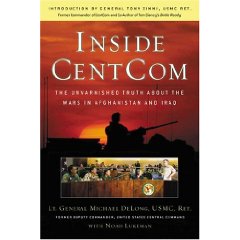In no way does this diminish the personal accomplishments of the author. He was clearly a great general and a loyal hard-working individual within the military chain of command. The book does however trouble me in that it has a very tight narrow focus on military operations “as ordered,” and does not reflect the kind of geo-political awareness and nuanced appreciation of non-military factors–diplomatic, cultural, economic, demographic–that I want to see at the flag level. His treatment of Sudan in passing is representative: astonished delight that they are “helping” in the war on terrorism, and no sense at all of the massive genocide of the Sudanese government against its own people.
On the intelligence aspect, this book smells a bit. The general has not been close enough to CIA to know that agents commit treason, case officers handle them–calling a CIA officer an “agent” is a sure sign of ignorance about what CIA does and how it does it. He also claims, contrary to many open source reports as well as government investigations, that Guantanamo produced “reams of intelligence.” In my own experience, tactical combatants have very little to offer in the way of strategic third-country intelligence leads, and on balance, I believe that while the general may have been led to believe that Guantanamo was a gold mine, in fact it was a tar pit and a blemish on the US Armed Forces. The author continues to be a believer in the now long-discredited Chalabi-DIA-CIA views on the presence of weapons of mass destruction, to the point of still being in the past on the issue of the aluminum tubes.
There are exactly two gems in this book. The first deals with the problems we had in supporting our Special Forces in Afghanistan above the 12,000 foot level (actually, anything above 6,000 feet challenges our aviation). I ask myself in the margin, “why on earth don't we have at least one squadron of helicopters optimized for high-altitude combat operations?” The Special Air Force may claim they do, but I don't believe it. We need a high-altitude unit capable of sustained long-haul operations at the 12,000 foot level, not just a few modified Chinooks and brave Chief Warrant Officers that “made do.”
The second gem in the book is a recounted discussion on the concept of Arab honor and how US troops in Iraq should have a special liaison unit that approached the families of each person killed “inadvertently” to offer a profound and sincere apology and an “accidental killing fee.” This resonates with me, and I was disappointed to see no further discussion–evidently the general heard and remembered this good idea, but did nothing to implement it.
I have ordered a copy of the Koran and will read it, because I respect this officer's account of how much good it did him in understanding his mission and the context for the mission (aided by a regular discussion of the contents with an Islamic practitioner).
Bottom line: great officer within his scope, moderate author within his mandate, the book is at about 60% of where I would expect to be given this officer's extraordinary access.





